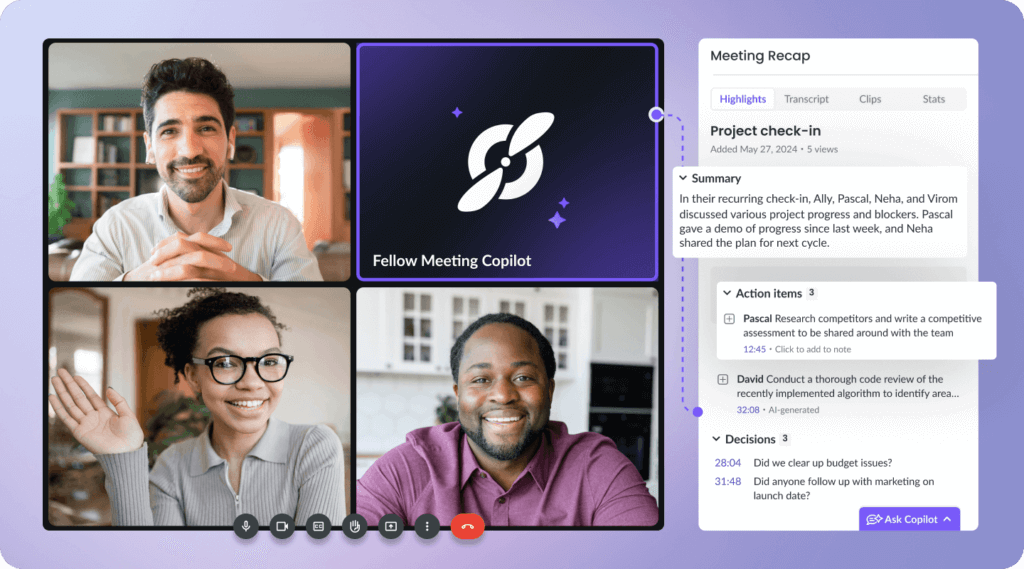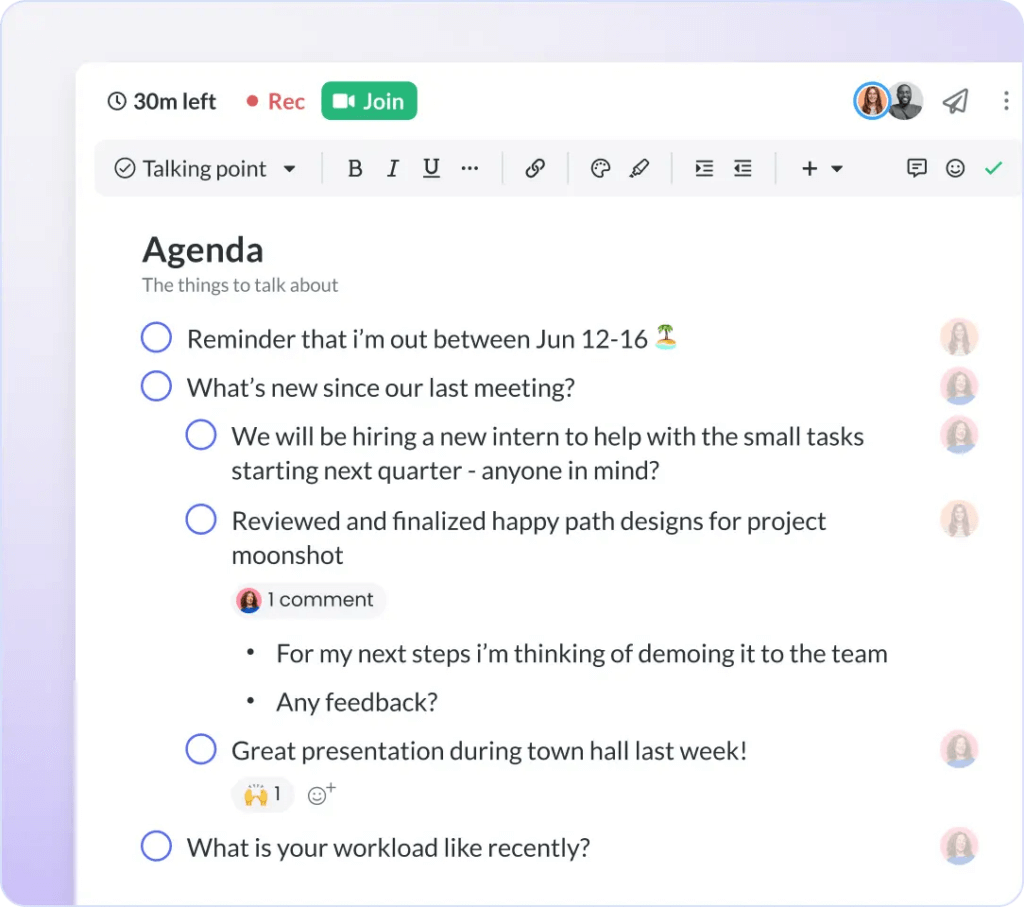32 Best Performance Review Questions for Employees
Performance reviews help managers gain valuable insights from their teams. Use these questions to help your team reach optimal performance.
An employee review is a type of meeting that takes place between a manager and employee, usually at the end of the year. It’s a discussion that covers employee performance and where feedback is openly exchanged by both parties.
Performance reviews are the perfect opportunity to provide constructive feedback to your employees, to understand their personal goals and to make a plan to attain them together. In fact, giving and receiving feedback is a pillar to any performance review. It’s also a chance for managers to become better leaders by gaining valuable takeaways from their team.
- Overall performance and accomplishments
- Employee strengths
- Areas of improvement
- Current role and future outlook
- Manager-employee relationship
- Company culture
- How to craft effective performance review questions
- Empowering dialogue with Fellow
Make sure to ask targeted and specific questions concerning performance, important goals, and aspirations to obtain even more valuable insights during a performance evaluation, and effectively phrase the feedback you provide. These questions will prove that you value employee engagement and the development of your team and that employee growth and satisfaction are your priorities. If you’re struggling to come up with questions, definitely refer to the following examples or even use AI for performance review ideation.

Stay present with AI note taking ✨
Fellow’s AI meeting assistant takes care of recording and transcribing meetings so participants can stay focused and engaged in the discussion.

Overall performance and accomplishments
Start performance reviews by understanding how your team member feels about their overall performance. This kind of employee feedback is important to see what your team members are proud of and understand how they feel they’re performing.
As a review process, it’s a good idea to ask how the team member did in realizing or not quite realizing their previously set goals. Find out what motivates them and which kind of working conditions allow them to thrive.
“What motivates you as an employee might not motivate your team members. Getting down to what truly motivates each employee is really critical if you want to drive optimal results across that entire team.”
– Sara Varni, CMO at Twilio on the Supermanagers Podcast
Here are some questions you can use to start a conversation about overall performance:
- What accomplishments this quarter are you most proud of?
- Which goals did you meet? Which goals fell short?
- What motivates you to get your job done?
- What can I do to make your job more enjoyable?
- What are your ideal working conditions to be the most productive?
- What was your greatest accomplishment at work?
- What do you hope to accomplish over the coming year?
Employee strengths
It’s important you focus on your team members’ strengths and acknowledge what they’re doing well in their current roles. In asking employees about their perceived strengths, you’ll also gain additional perspective because the qualities they share may differ from those you notice. In many cases, there are skills that managers are unaware of because the employee hasn’t had the opportunity to showcase them yet.
Providing positive feedback to your employees is a great performance management opportunity for you to understand how you can manage strengths and utilize them for the organization’s benefit. Ask questions such as:
- What skills do you have that you believe we could use more effectively?
- What personal strengths help you do your job effectively?
- What makes you the best fit for your position?
- What kind of work comes easiest to you?
Areas of improvement
Next, you want to focus on areas of improvement. This will teach you what your employee wants to work on and how you can help them. There’s always room for improvement, no matter how well an employee is performing—feedback is valuable for any effective employee. According to the Harvard Business Review, “Employees want more accurate and candid negative feedback, so it’s a win for all if managers can give it. But managers should be aware of potential implications for their employees’ well-being and on retention if evaluations become too harsh.”
Make sure you’re taking a constructive rather than critical approach. Focus on one or two key points to avoid overwhelming your employee, and ensure the feedback is constructive, and not critical. You can try to engage in a dialogue by asking questions like:
- What were you least proud of this quarter?
- How will you do those differently in the future?
- What 2-3 things will you focus on in the next quarter to help you grow and develop?
- What can I do to help you better meet your goals?
- Where do you feel there’s room for you to improve?
Current role and future outlook
Discussing your team members’ current responsibilities can help you understand their feelings about their role. By asking about which aspects they enjoy and which they don’t, you can adjust their workflow for increased motivation. Knowing this is crucial in ensuring they feel valued.
Looking ahead, it’s crucial to inquire and discuss your employee’s future aspirations and how you can support their growth and goal achievement. With the shift to more remote work, the Harvard Business Review suggests that performance reviews should be adapted to be more frequent, allowing employees to make adjustments and calibrations based on real feedback.
“This period ‘represents an opportunity to pivot toward a people-focused management system, built around resilience and agility, instead of efficiency and competitiveness at any cost.'”
Mark Mortensen, Associate Professor of Organizational behavior at INSEAD
Here are some questions you can ask about their current role and future:
- Which job responsibilities/tasks do you enjoy most?
- Which job responsibilities do you least enjoy?
- What do you want your next position at this company to be?
- How would your responsibilities change?
Manager-employee relationship
Everyone likes to be managed in different ways, so it is really important that you discuss what kind of management style works best for your employees. This can help you learn how to effectively manage, motivate and support your team. Lastly, ask if there’s anything you can do to better support them in their role.
- What (if any) concerns do you have when it comes to giving me feedback?
- How can I alleviate those concerns?
- How do you prefer to receive feedback and/or recognition?
- How often would you like to have check-ins or updates with me
- What are one or two things I could do differently to better manage you?
- What actions of mine are most and least helpful in your work?
- How has management helped and hindered your work?
Company culture
A huge part of employee engagement and satisfaction is company culture and how well-integrated the team members feel, so make sure to address this during the review. This can help you understand how comfortable they are with the corporate culture and its influence on employee productivity and engagement. Consider asking:
- What are the main drivers of success in the company?
- Are you comfortable with our corporate culture, and are there areas that need improvement?
- What’s your favorite part about working in this company?
- How can we make our company more inclusive and diverse?
- When have you felt the proudest about being part of this company?
How to craft effective performance review questions
The objective of the review
Reviews can focus on evaluating performance or planning for future development.
- For evaluation reviews, check-in 1-2 times a year on goals set during the past review session and measure how much has been achieved. This can help inform decisions about compensation, bonuses, or promotions.
- For reviews on employee development, you should aim to provide feedback, identify areas for improvement, and create a performance improvement plan for advancing. These should happen more often, maybe 2-4 times a year.
Planning and understanding what information you need to gather will ensure your performance appraisals are effective and on target.
The best questions to ask
Performance reviews are most effective when they include a mix of qualitative and quantitative feedback.
Qualitative Feedback: Some aspects of performance, like contributions to company culture and teamwork, cant be measured in numbers. Recognizing these contributions is crucial in evaluating an employee’s overall impact.
- How effectively does this person work independently?
- To what extent has this person improved the skills of their colleagues?
Quantitative Feedback: Use specific data to assess performance to reduce misinterpretation and provide clear insight into performance trends. This requires well-defined KPIs set by leaders, HR, and managers.
- How does this person’s output compare to the company average?
- What impact has this person’s work had on revenue?
What you should measure
In crafting performance review questions, consider these key categories of employee performance: skills, strengths, behaviors, and outcomes. The focus depends on what’s crucial for your organization’s decision-making.
Skills: How effectively has this person met deadlines? How creatively did they solve problems? How well did they share knowledge with others?
Strengths: How adeptly did this person handle conflict? How involved were they in organizing team or company events? How proactive were they in anticipating problems?
Behaviors: How did they embody the company’s values? How helpful were they to coworkers? How did they respect others’ opinions?
Outcomes: How successfully did they achieve their KPIs? What was their impact on work quality? How did they demonstrate growth or learning?
Remember, the best performance reviews assess these aspects objectively and are tied to specific timeframes. Always ask for evidence in open-ended questions to support the evaluations.
Empowering Dialogue With Fellow
Using Fellow during your performance reviews can significantly enhance discussion and dialogue between managers and employees. Before you conduct your review, Fellow’s feedback feature can make it easy to provide and ask for feedback, and also keep a history of the feedback you exchange and visualize your growth. As well, you can give everyone time to prep for your questions by putting them in a collaborative agenda.

When the performance meeting occurs, you can use Fellow’s AI note-taking to record, transcribe, and summarize the meeting and key decisions to make sure you don’t miss a detail. Once your review is complete and your future plan is clear, you can use the Objective and Key Results tool to clearly set, track, and measure your goals.










